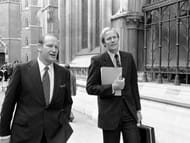Packer though was far from done. In late May 1977, he reached England in a last-ditch attempt at reconciliation with the ACB. On his side this time was Richie Benaud as a consultant-cum-politicist.
The issue had by now gone from a mere Australian domestic problem to one which could threaten the entire cricketing world, and hence the International Cricket Conference (ICC) felt inclined to step in. A team from the ICC met Packer and Benaud at Lord’s on the 23rd of June to discuss the issue.
It took them 90 minutes to reach a common consensus, only for Packer to demand exclusive rights to Australian cricket after the ’78-’79 season ended. This was outside the ICC’s ambit and Packer stormed out of the meeting room but not before declaring war. “Had I got those TV rights, I was prepared to withdraw from the scene and leave the running of cricket to the board. I will take no steps now to help anyone. It’s every man for himself and the devil take the hindmost”, he thundered.
The ICC retaliated by deciding not to award first-class status to Packer’s matches as well as banning the players involved from Test and first-class cricket. The players themselves were shaken as, till that point of time, they had seen Packer the philanthropist, and now all they could see was Packer the businessman. A number of players now considered withdrawal as a serious option.
Responding to this, Packer had three of his players – Greig, the South African all-rounder Mike Proctor and the English fast bowler John Snow – file a petition in High Court to prevent a third party from influencing the players to break their contracts. The third party, in this case, was the ICC.
ICC’s counsel reasoned that if the top players left cricket to join Packer, the gate receipts at international matches would decrease. As expected, Justice Christopher Slade found this little more than amusing and he judged that the ICC was merely trying to protect its own interest at the expense of the players’ personal choices, and that the concept of loyalty might have been stretched too far.
Still, Packer could not use the term “Test Match” or call his team “Australia”, or use the official rules of cricket, as all of these were copyrighted to the MCC.
Everyone, except the ICC and the ACB, was notably pleased at this verdict as the players could have the best of both worlds and their parent clubs could still retain their services for first-class cricket.
Benaud started framing the rules for this series which would consist of five “SuperTests” played by the “World Series Cricket Australian XI”.
Packer was well and truly on his way; the only headache for him now was finding a suitable playground for his “big boys” in a very short time, since the ACB had shut the WSC out of its traditional cricket venues.
Brand-new app in a brand-new avatar! Download Cric Rocket for fast cricket scores, rocket flicks, super notifications and much more!

